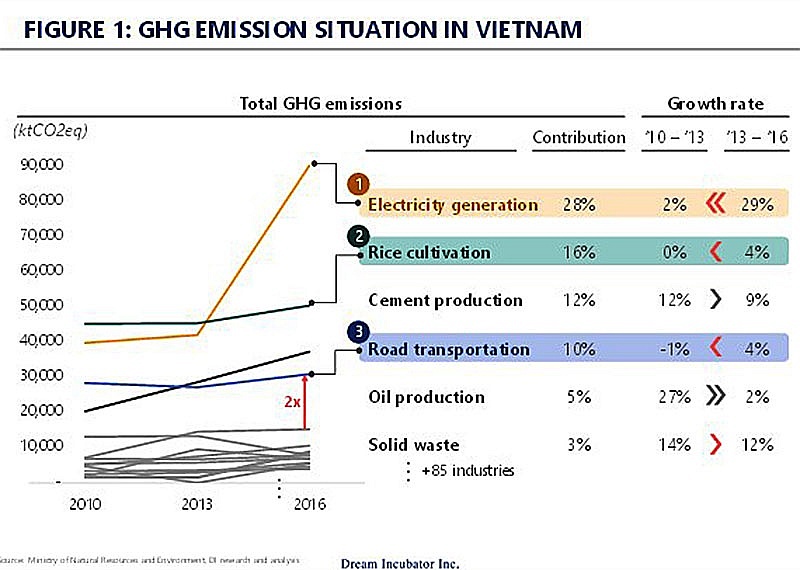Innovating towards net zero: energy, rice, and transportation in Vietnam
Making net zero targets a reality would require practical solutions toward massive cuts in GHG emissions, especially in industries with high emission. In its latest report, Dream Incubator (DI) shows the causes of emission and possible directions for emission mitigation in top-emitting industries in Vietnam.
 |
For Vietnam, electricity generation, rice cultivation, and road transportation should be tackled as the top emitters with alarmingly elevated growth rates.
Electricity generation has largely been known as the No.1 contributor to GHG emission in Vietnam, with coal being the most common cause. To mitigate emissions from coal-fired power plants, one solution is to encourage more renewable sources, most notably wind and solar. However, renewable energy developers are now struggling with the expiry of feed-in tariffs (FiT) scheme. Even though it is not yet official, Vietnam seems to be moving towards an auction scheme based on recent comments from government officials.
To provide reference of a strategy that helps companies compete in the potential auction environment, DI’s report presents a case study on the farm-down model from Ørsted - the world’s largest producer of off-shore wind energy. The model involves early divestment of ownership in offshore wind projects, the proceeds of which will be reinvested into building new farms. The model has helped to reduce the company’s debt burden and risk exposure while Ørsted continuously expands its capacity.
The second industry for decarbonisation is rice cultivation, which forms 15.7 per cent of Vietnam’s GHG emissions, of which 100 per cent is CH4. Paddy fields are a substantial source of GHG emissions primarily due to water submergence, weak rice grain health, and weak soil health. These issues happen because sustainable farming techniques are still limited among farmers in Vietnam.
DI’s analysis points out that access to credit is essential for the adoption of sustainable farming practices among farmers. The Responsibility Commodities Facility (RCF) is one example of how Brazil incentivizes CH4 mitigation while ensures financial returns for soybean farmers. The RCF was established to address Brazil’s deforestation by providing financial incentives to produce soy in existing cleared and degraded lands, discouraging further expansion of agricultural land.
The third industry is road transportation with large emission caused by intensive use of petroleum vehicles. Furthermore, as infrastructure and public transportation system are underdeveloped, Vietnam is still dependent on small-load trucks for freight transport and personal vehicles (motorbike being dominant) for passenger transport. This has resulted in an enormous number of high-emission vehicles on the road.
Accordingly, some solutions have been applied to mitigate these emissions, one of which is the adoption of electric vehicles (EV). This has become a potential solution thanks to prominent movements from both the government and private sector. VinFast’ EV journey is presented as a prominent case study of a domestic manufacturer with good signs of success in both domestic and foreign markets. Recently, the company has been able to raise billions of dollars from banks such as Credit Suisse and Citigroup to realise its global ambition.
It is obvious that reducing GHG emissions from electricity generation, rice cultivation, and road transportation is inevitable for Vietnam to save its environment. Those who pursue the quest to go green in Vietnam should embrace business model innovation to secure success.
Read the full report of innovate towards net zero: energy, rice, and transportation in vietnam here
| DI consultant team: Kazuhiro Nakashoji, director, Mai-Linh Dang, associate manager, Phuc Canh Le, associate and Thuy-Nga Le, associate. More than a traditional consulting firm, Dream Incubator (DI) is a “business producing company”. DI’s services, which originally focused on strategy consulting and venture incubation, have currently evolved into “business producing”, which provides a wide range of support for client companies to create the business. DI is also committed to exploring new business fields with the management of group companies and investment and incubation of innovative venture firms. |
What the stars mean:
★ Poor ★ ★ Promising ★★★ Good ★★★★ Very good ★★★★★ Exceptional
Related Contents
Latest News
More News
- Citi economists project robust Vietnam economic growth in 2026 (February 14, 2026 | 18:00)
- Sustaining high growth must be balanced in stable manner (February 14, 2026 | 09:00)
- From 5G to 6G: how AI is shaping Vietnam’s path to digital leadership (February 13, 2026 | 10:59)
- Cooperation must align with Vietnam’s long-term ambitions (February 13, 2026 | 09:00)
- Need-to-know aspects ahead of AI law (February 13, 2026 | 08:00)
- Legalities to early operations for Vietnam’s IFC (February 11, 2026 | 12:17)
- Foreign-language trademarks gain traction in Vietnam (February 06, 2026 | 09:26)
- Offshore structuring and the Singapore holding route (February 02, 2026 | 10:39)
- Vietnam enters new development era: Russian scholar (January 25, 2026 | 10:08)
- 14th National Party Congress marks new era, expands Vietnam’s global role: Australian scholar (January 25, 2026 | 09:54)

 Tag:
Tag:



















 Mobile Version
Mobile Version